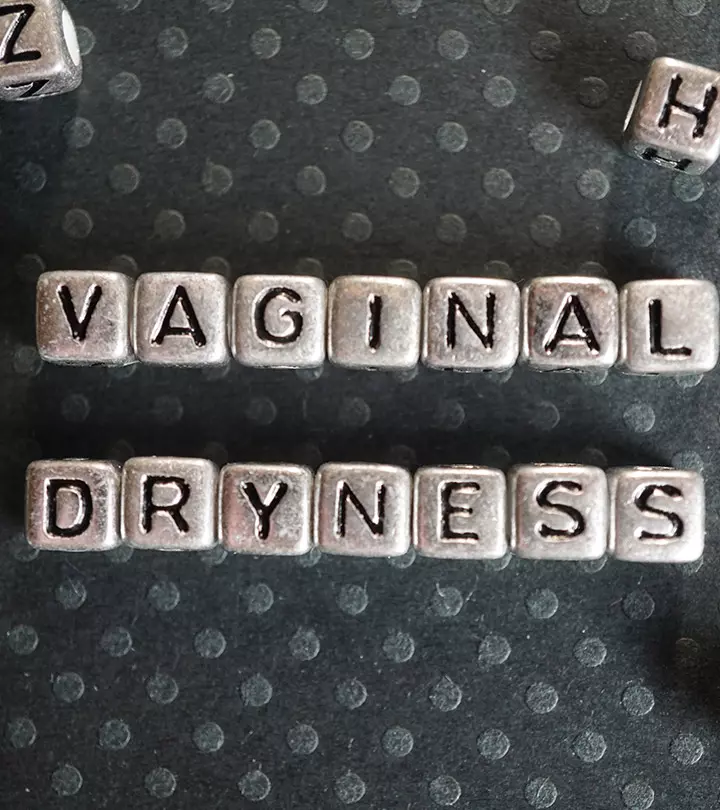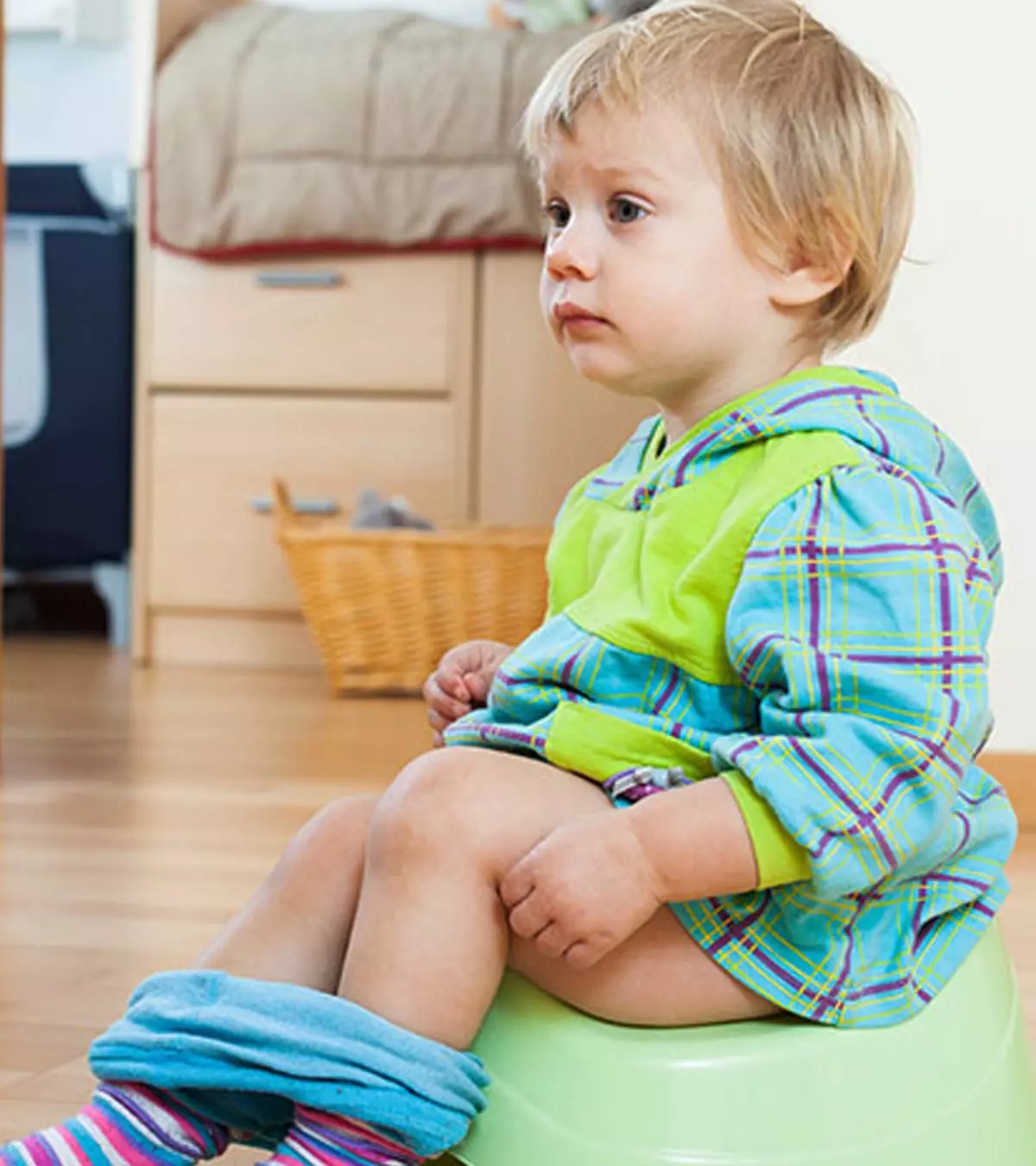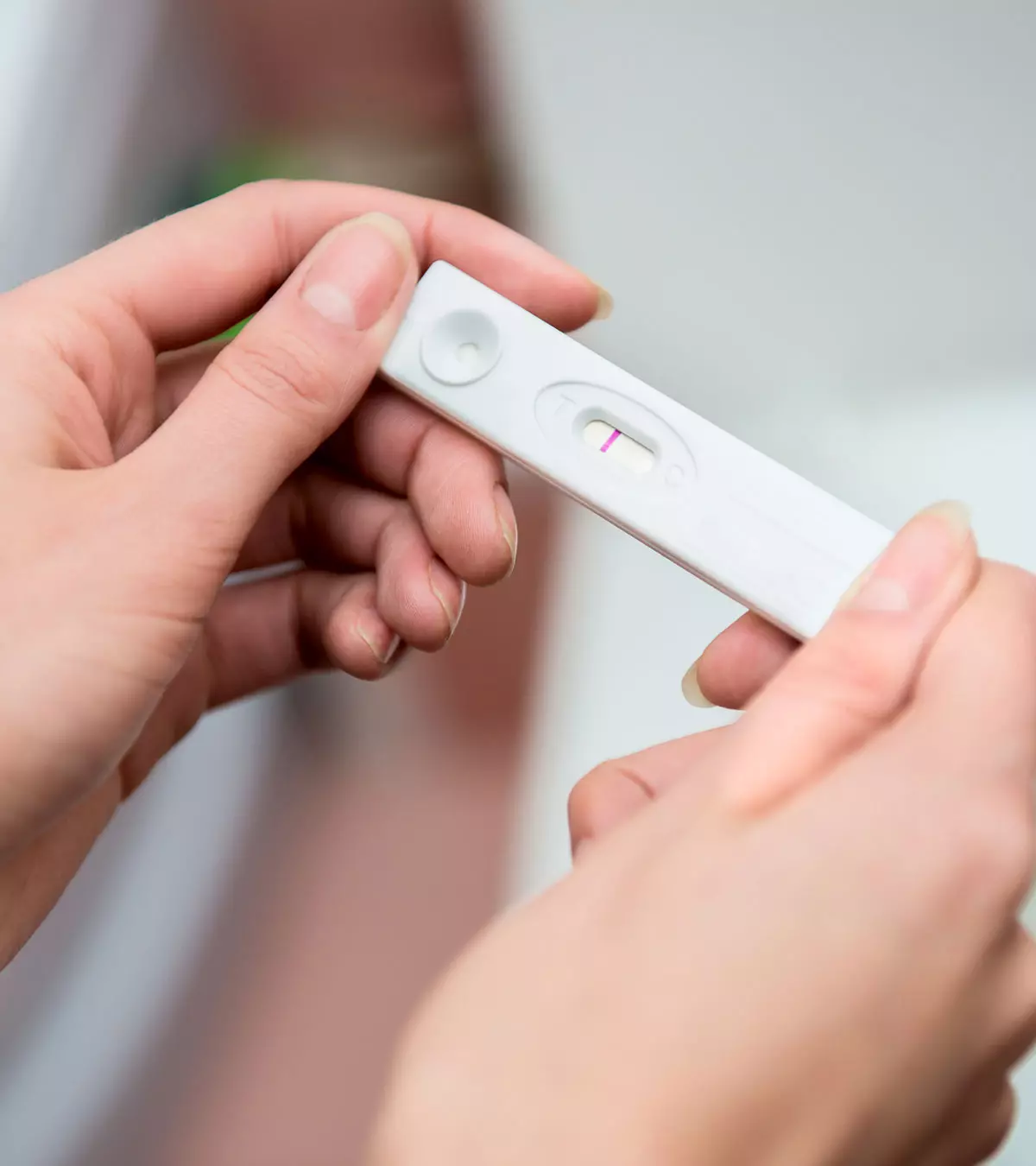
Image: iStock
Several hormonal and physical changes can cause crying in pregnancy. These changes bring a lot of stress to women, and some women may find it more difficult to cope with stress than others. Pregnancy can be overwhelming and lead to mood swings and make you cry.
While crying does not have significant side effects for most pregnant women, excessive and persistent crying during pregnancy may indicate other underlying mental health problems such as depression or anxiety. Read on the post as we discuss the causes, side effects, and management of crying during pregnancy.
Key Pointers
- Stress, mood swings, and hormonal changes in pregnancy can increase crying without specific reasons.
- Physical discomforts such as pains, skin changes, and emotional events or scenes can make a pregnant woman cry.
- Occasional cries in pregnancy are normal. However, women who cry more frequently should seek medical care to evaluate mental health concerns such as depression.
What Are The Causes Of Increased Crying In Pregnancy?
The following causes could lead to crying in pregnancy:
1. Hormonal changes
Increasing levels of estrogen and progesterone can make pregnant women experience strong emotions and make them tearful often.
Once the body adapts to the fluctuating hormonal levels, the emotions may settle down. However, some women may continue to undergo emotional instability throughout the pregnancy (1).
Sandi, a mom and blogger, shares how pregnancy hormones meddled with her emotions and made her sob over seemingly unrelated things. She says, “I understand my tears over How I Met Your Mother re-runs, but when I broke down crying while grocery shopping, I had to leave the store because that’s how heavy my sobs were. When the husband rushed outside to find out what happened to me, I could barely explain that I wanted ALL the food amidst the breathless tears.
“Yes, I cried because I spent time walking through Woolworths and Checkers wanting to eat everything – fruit, snacks, cakes, everything. But I didn’t allow myself to buy anything, so I became so upset about depriving myself of something I felt I really NEEDED (i).”
2. Mood swings
Physical stress, fatigue, changes in metabolism, and pregnancy hormones can cause many mood swings in pregnant women. They are more common in the first trimester, between six and ten weeks. These mood swings may reappear in the third trimester (2).
3. Stress

Image: IStock
Stress during pregnancy can arise from various concerns, including thoughts of labor, childbirth, childcare, finances, etc. This is particularly common with first-time mothers. It may lead to crying during pregnancy (3).
4. Physical changes
The following physical changes could make an expecting mother tearful:
- Skin changes such as stretch marks could make it difficult for some women to accept the changes in their bodies. As per the data published by the National Institute of Health, striae distensae (stretched skin) occurs in 43% to 88%) of pregnancies.
- Discomforts of pregnancy such as nausea or vomiting during the first trimester (or throughout the pregnancy), sleep disturbances, frequent urination during the night, and exhaustion of carrying excess weight could trigger crying spells.
5. Emotional moments
Some examples of emotional situations that could make an expectant mother cry include:
- Watching an emotional scene in a movie or a TV show.
- Going through the photographs of a young baby or parent-child relationships.
- Watching videos of baby animals in trouble.
- Witnessing the precious pregnancy milestones such as seeing the baby’s heartbeat for the first time, seeing the baby on an ultrasound, or feeling the baby’s kick can make it difficult for you to hold back your tears.
- People commenting on your womb being too small or too big, on your changed appearance in pregnancy, or about how having a baby will change your life, career, and relationship with your spouse may bring an expectant mother in tears.
- During the second trimester, some women may no longer fit in their regular clothes but are still small for their maternity clothes. Having no good clothes to wear during important social events or official meetings may leave a woman in crying spells.
- Going past your due date and not having any signs of upcoming labor can make a pregnant mother feel impatient and frustrated.
When Is Crying During Pregnancy A Serious Problem?
While crying, emotional distress, and breakdowns during pregnancy are not uncommon, in some cases, crying may also be a symptom of a serious underlying mental condition such as depression.
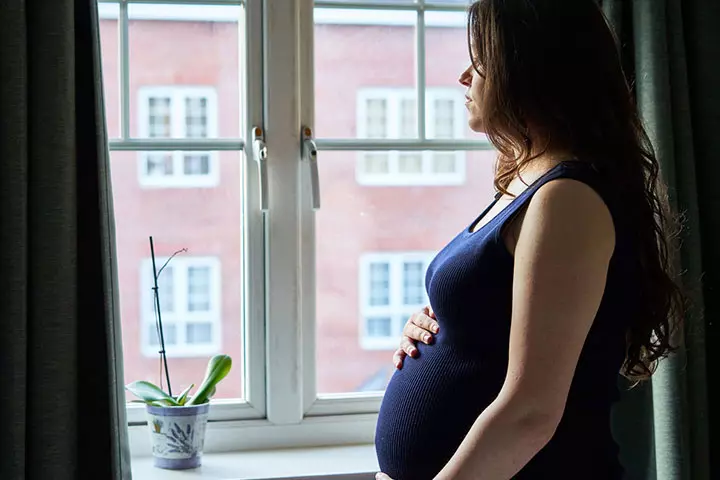
Image: Shutterstock
Depression in pregnancy is called perinatal or prenatal depression. It is one of the common pregnancy conditions and may affect about one in seven women. The signs and symptoms of prenatal depression include (4):
- Sadness, hopelessness, or feeling overwhelmed
- Restlessness
- Moody behavior
- Weeping or sobbing or crying most of the time
- Feeling guilty or worthless
- Having self-harm or suicidal thoughts
- Changes in appetite
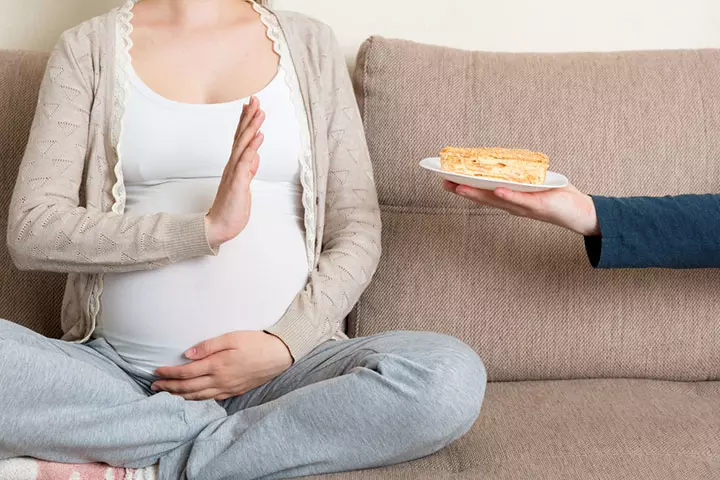
Image: Shutterstock
- Problems with decision-making, focusing, or remembering things
- Loss of interest in activities that you liked earlier
- Withdrawing from friends and family
- Losing interest in things that were liked previously
- Feeling weak, tired, and lethargic most of the time
- Complaining of headache, stomachache, or other pains that do not go away.
Expectant mothers must monitor their emotional well-being. If feelings of hopelessness, sadness, or anxiety last for more than two weeks, consult your healthcare provider for support.
 Quick fact
Quick factCan Crying And Depression Affect An Unborn Baby?
While occasional crying does not cause any adverse effects on the developing baby, depression during pregnancy may have harmful effects on the developing baby.
Prenatal depression may increase the risk for the following (4).
- Premature birth
- Babies born small for their gestational age (SGA).
- Babies born with low birth weight (less than five pounds eight ounces).
- Babies may exhibit behaviors such as increased irritability, reduced activity levels, reduced attention, and lesser facial expressions.

Image: Shutterstock
- Babies may experience learning difficulties, behavior problems, developmental problems, and mental health conditions after they grow up.
- Mothers suffering from depression may not pay attention to their nutrition and prenatal checkups. It may cause an impact on the baby’s growth and development.
- While occasional crying does not harm the mother or the child, a study performed on a small group suggests that negative emotions or life events will increase the pregnant woman’s risk for miscarriage (5).
 Did you know?
Did you know?How To Cope With Crying Spells During Pregnancy?
The following tips may help you manage the crying episodes during pregnancy.
- Get enough sleep
Little or insufficient sleep can increase stress and make you cry more often.
- Indulge in permissible physical activities
Gentle exercises can boost your mood and energy. A brisk walk, swim session, a low-impact aerobic class, yoga sessions, etc., can help improve your mood and happiness levels. Exercising reduces the risk of anxiety and depression. However, the doctor may ask you to stop doing exercises in some health conditions (6).
- Talk to other pregnant mothers

Image: Shutterstock
Doing so can help you feel that you are not alone. It may ease your fears and apprehensions associated with pregnancy. Local or online mom support groups can help you share each others’ experiences, personal stories, advice and provide you with the needed emotional support.
- Do not overwhelm
Do not overburden yourself by preparing the baby essentials before they arrive. Let your friends and family members help you. Excessive mental pressure can cause fatigue, frustration, guilt, and eventually crying episodes.
 Quick tip
Quick tipFrequently Asked Questions
1. Does my baby in the womb know when I am crying?
Reports suggest that babies in your womb can sense all your emotional aspects and feelings similarly to you. Therefore, when you cry during pregnancy, your baby might feel this emotion to be their own (7).
2. How long do crying spells last in pregnancy?
Depending on the underlying reasons, crying spells may last from a few days to a few weeks in pregnancy. However, it is ideal to seek medical attention promptly if you experience frequent or severe crying spells (with or without apparent reasons) while pregnant (8).
3. How can partners and loved ones support a pregnant woman who is crying more often?
Maintaining a healthy wife and husband relationship during pregnancy is essential to keep your partner happy. Encourage her to share her concerns and validate her emotions to make her feel understood and supported. Provide reassurance that you have their back in every situation. Practice patience and provide practical support by offering her help in daily chores and duties. Most importantly, shower her with physical affection, such as hugs, kisses, and cuddling, to give her warmth and security (12).
4. Is it possible to prevent crying during pregnancy?
Occasional breakdowns are a normal part of emotional changes during pregnancy. While preventing crying spells during pregnancy may not be possible, you can manage them by prioritizing self-care and maintaining open communication with your partner. Understanding how to be happy during pregnancy is vital. It involves healthy living and stress reduction using calming techniques like deep breathing and journaling. These methods can help you smoothly navigate the emotional aspects of pregnancy (1).
Crying in pregnancy is a common occurrence mainly caused by ongoing hormonal changes in the body. Pregnancy can be an overwhelming period for a woman, considering the new responsibilities she will have to take up after the birth of her child. Thus, you should consider asking for help from your partner, family, or a medical professional to deal with the situation. However, if you feel like you may be prone to depression during this period, consult a psychotherapist immediately, as ignoring the condition may adversely affect the fetus’s well-being.
Infographic: Alternative Ways To Manage Crying Spells When Pregnant
As your hormones ramp up, it is not uncommon to experience mood swings and episodes of crying for no apparent reason when pregnant. Here is an infographic that describes what to do to combat stress and stay happy and calm during pregnancy. Illustration: Momjunction Design Team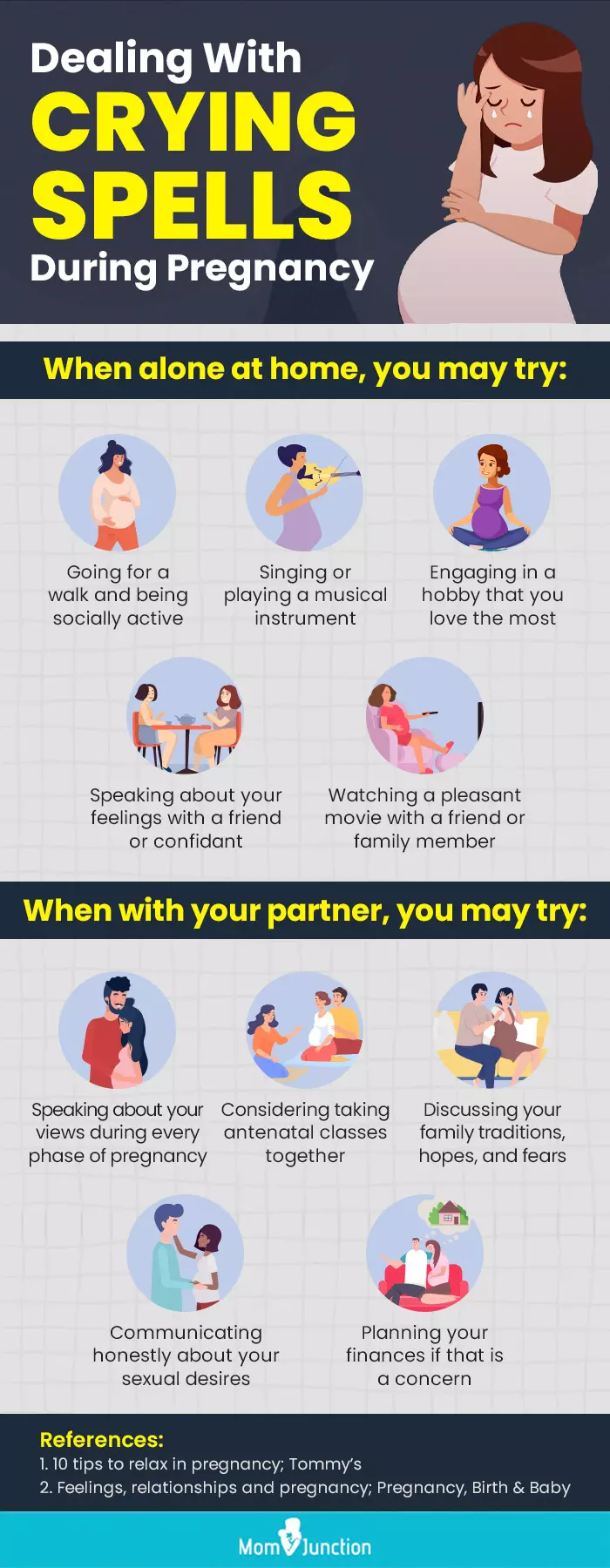
Illustration: Crying During Pregnancy: Causes And Effects On Unborn Baby
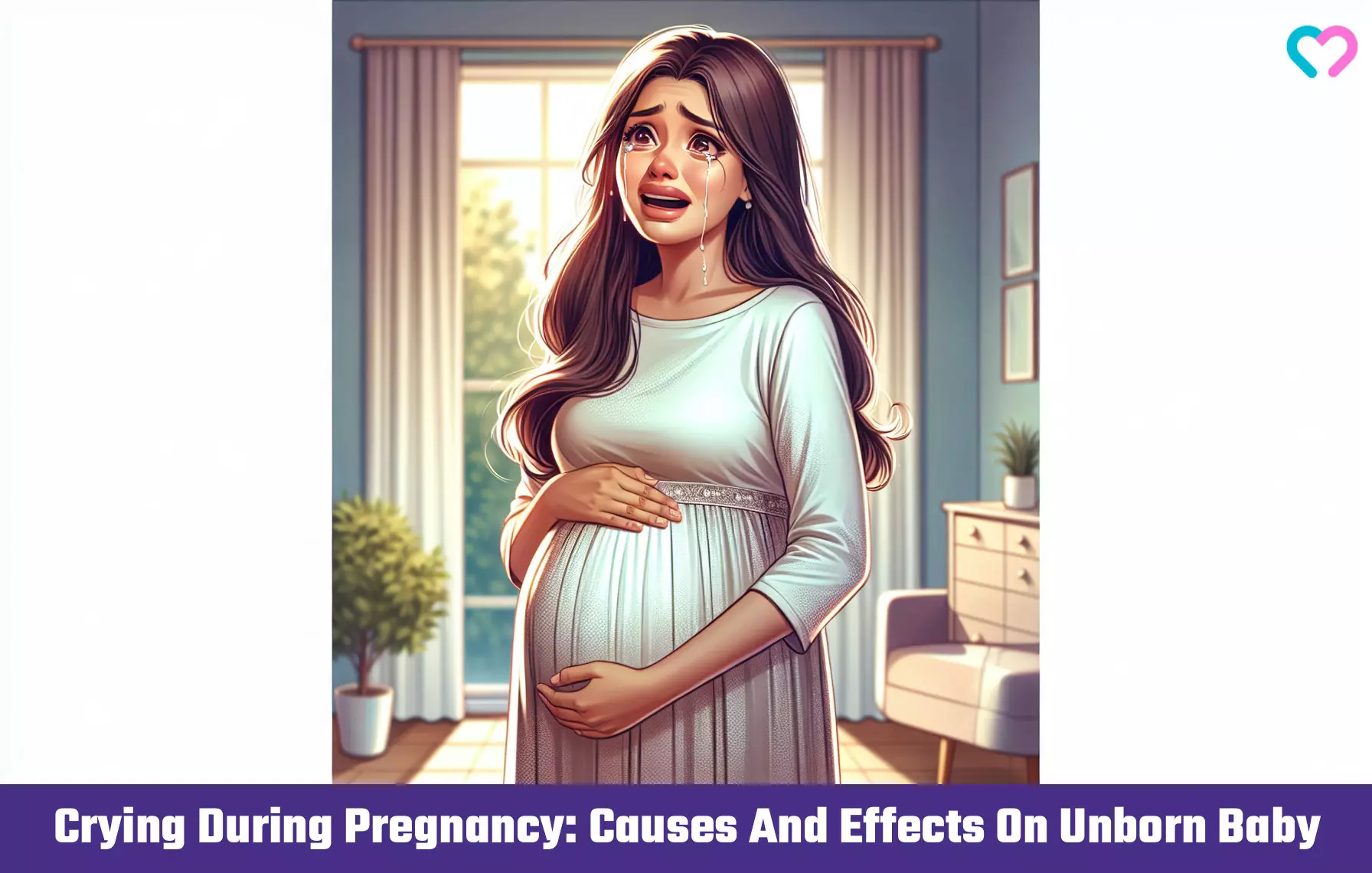
Image: Stable Diffusion/MomJunction Design Team
Personal Experience: Source
MomJunction articles include first-hand experiences to provide you with better insights through real-life narratives. Here are the sources of personal accounts referenced in this article.
i. Damn you pregnancy hormones!https://sandisplash.blogspot.com/2016/04/damn-you-pregnancy-hormones.html
References
- Emotions during pregnancy.
https://www.nct.org.uk/information/pregnancy/wellbeing-and-lifestyle-pregnancy/common-emotions-when-expecting-baby - Mood Swings During Pregnancy.
https://americanpregnancy.org/healthy-pregnancy/pregnancy-health-wellness/mood-swings-during-pregnancy/ - STRESS AND PREGNANCY.
https://www.marchofdimes.org/find-support/topics/pregnancy/stress-and-pregnancy - DEPRESSION DURING PREGNANCY.
https://www.marchofdimes.org/find-support/topics/pregnancy/depression-during-pregnancy - Huilin XING et al; (2018); Effects of Negative Emotions and Life Events on Women’s Missed Miscarriage.
https://www.ncbi.nlm.nih.gov/pmc/articles/PMC5810384/ - Pregnancy and exercise.
https://www.betterhealth.vic.gov.au/health/healthyliving/pregnancy-and-exercise#benefits-of-exercise-during-pregnancy - When I Feel Sad While Pregnant, Does My Baby Feel Sad?
https://rmccares.org/2020/08/06/when-i-feel-sad-while-pregnant-does-my-baby-feel-sad/ - Prenatal Depression
https://www.beaumont.org/conditions/prenatal-depression - About Perinatal Mood Disorders.
https://www.nj.gov/health/fhs/maternalchild/mentalhealth/about-disorders/ - Marcel F van der Wal et al.; (2007); Stress and emotional problems during pregnancy and excessive infant crying.
https://pubmed.ncbi.nlm.nih.gov/18091087/ - How to Manage Stress Naturally During Pregnancy.
https://www.sbm.org/healthy-living/how-to-manage-stress-naturally-during-pregnancy - Supporting your partner during her pregnancy.
https://www.pregnancybirthbaby.org.au/supporting-your-partner-during-pregnancy
Community Experiences
Join the conversation and become a part of our nurturing community! Share your stories, experiences, and insights to connect with fellow parents.
Read full bio of Dr. Richa Hatila Singh
Read full bio of Dr. Ritika Shah
Read full bio of Rebecca Malachi
Read full bio of Dr. Joyani Das














